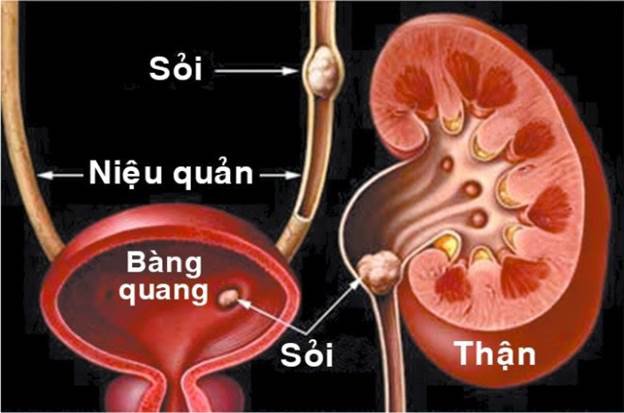Learn about anuria
The article was professionally consulted by a Doctor Urologist - Department of General Surgery & Anesthesia - Vinmec Hai Phong International General Hospital.
Anuria or dysuria occurs when the kidneys do not produce urine. You may have little urine at first and then anuria. Anuria is common in patients with kidney disease, sometimes cardiovascular disease, electrolyte disorders or simply due to improper eating habits.
1. The concept of anuria
In the body, urine is formed through 3 processes:
The process of filtering blood at the glomerulus. Renal tubular reabsorption. Formal urine formation. On average, every day, about 170-180 liters of first urine is produced during the glomerular filtration of blood. The first urine is then sent down the renal tubules for reabsorption. At this time, the nutrients needed by the body are reabsorbed and brought back, only 1-2 liters of urine are actually formed and poured into the renal pelvis, down the ureters, through the bladder and urethra, and then excreted. outside. Therefore, on average, a person will pass 1-2 liters of urine per day.
Anuria is the absence of urine in the bladder. Anuria usually occurs when the kidneys are not able to produce enough urine to pass out.

2. Causes of anuria
Causes of your inability to urinate include:
Kidney disease:
Nephritis such as severe acute glomerulonephritis, acute tubular nephritis, leptospira nephritis. Kidney stones cause stasis, water retention in the renal tubules and glomeruli, Albumin index leads to decrease in urine output. Tuberculosis of the kidney damages the renal parenchyma, causing little or no urine. End stage kidney cancer. Extra-renal disease: Any condition that causes dehydration or reduces blood flow to the kidneys can cause anuria.
High fever, vomiting a lot, diarrhea for a long time causing dehydration. Due to cardiovascular diseases such as heart failure, blood loss reduces blood flow to the kidneys, and at the same time reduces renal artery pressure. Cirrhosis . In addition to the above diseases, anuria can occur due to lifestyle habits such as:
Due to binge eating. Because drinking too little water leads to less urine production, the volume of blood reaching the kidneys decreases. Due to excessive sweating: Sweat has a composition similar to urine. People who sweat a lot will easily lose water and salt from the body. At this time, to ensure health as well as the body's activities, the kidneys need to limit the excretory activity. Urine also follows that is excreted less leading to anuria.

3. Clinical manifestations of anuria
Anuria is characterized by low urine output, 24-hour urine output less than 300ml, sometimes pain and discomfort in the lower urinary tract due to lesions.
Anuria is a clinical symptom, not a specific disease. Therefore, in clinical practice, anuria often appears together with symptoms of other diseases of the body such as:
Manifestations of kidney diseases:
Swelling of legs, feet and ankles legs and even face. The most painful back is the right iliac fossa. Dizziness, nausea, fatigue, there may be itchy rashes on the body. Sometimes patients have reduced concentration, difficulty breathing. Manifestations of heart failure:
People are tired, pale. Tachycardia or arrhythmia. Headache, dizziness with difficulty breathing. Pain in left chest. Vomiting, nausea, purple lips, changes in blood pressure... For different pathological causes, in different cases, anuria patients have different pathological manifestations.
Urinating is an important process that helps the body get rid of waste or excess fluids in the body. In people who cannot urinate, urine is not excreted, waste products will be retained in the body, accumulated in the body, first affecting the filtering activity of the kidneys, then affecting the kidneys. effects on other organs leading to deterioration of health.
Anuria is also a warning sign of underlying medical risks. Therefore, do not neglect, take care of your health by paying attention to the amount of urine each day and go to medical facilities as soon as you see abnormal signs in your body.
Để đặt lịch khám tại viện, Quý khách vui lòng bấm số HOTLINE hoặc đặt lịch trực tiếp TẠI ĐÂY. Tải và đặt lịch khám tự động trên ứng dụng MyVinmec để quản lý, theo dõi lịch và đặt hẹn mọi lúc mọi nơi ngay trên ứng dụng.






